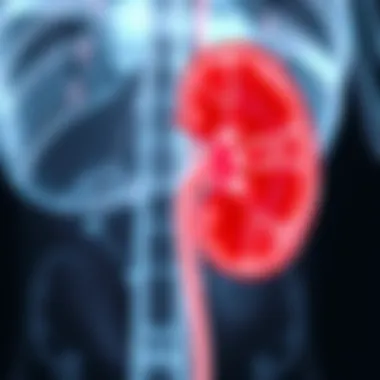Renal Cell Carcinoma vs Kidney Cancer: Key Differences


Intro
Understanding kidney cancer is not merely an academic endeavor; it's a vital pursuit that can influence treatment strategies, patient outcomes, and the overall approach to renal oncology. Kidney cancer is an umbrella term encompassing a variety of malignancies that can arise in the renal system. Among these, renal cell carcinoma (RCC) stands out as the most prevalent form, which warrants further exploration.
As we delve into the differences between kidney cancer at large and RCC specifically, it's critical to define the landscape of these medical conditions. RCC is characterized by specific histological features and clinical behavior, setting it apart from other types of kidney cancers. This distinction carries significant implications for the diagnosis and management of patients.
With the increasing incidence of kidney cancer globally, understanding its various forms becomes crucial for healthcare professionals, researchers, and patients alike. This article aims to clarify these differences and provide insight into diagnosis, epidemiology, risk factors, and current treatments associated with these conditions.
In the subsequent sections, we will dissect the critical elements that influence the understanding and management of renal malignancies, laying a foundation for a more sophisticated grasp of how RCC fits within the broader category of kidney cancer.
Prelims
Understanding kidney cancer and its specific forms is crucial for both medical professionals and patients. This article aims to dissect the essential distinctions between renal cell carcinoma (RCC) and the broader category of kidney cancer. Although both terms are often used interchangeably, comprehending these nuances can immensely influence diagnosis, treatment, and ultimately, patient outcomes.
In diving deeper into this topic, we will outline how renal cell carcinoma represents a specific type of kidney cancer, with its own unique clinical aspects and treatment pathways. This distinction is not just academic; it has real-world implications for patient management and therapeutic approaches.
Furthermore, grasping the characteristics and classifications of kidney tumors helps in formulating risk assessments and designing personalized treatment plans. By highlighting these differences, medical practitioners can equip themselves with a more profound understanding necessary for effective patient care.
Throughout this exploration, we'll discuss the epidemiology, diagnostic techniques, and even the latest innovations in therapies. All of this will serve to offer a robust framework for understanding these conditions, tailored to students, researchers, educators, and healthcare professionals alike. The spotlight on renal oncology's complexities not only fosters knowledge but also promotes better treatment strategies moving forward.
“Knowledge is power.” Without a clear understanding of these distinctions, both patients and healthcare providers may find themselves navigating a convoluted landscape when faced with a cancer diagnosis.
This detailed overview will hopefully shed light on the significant differences between RCC and kidney cancer, endeavoring to spark insightful discussions and enhance awareness within the medical community.
Defining Kidney Cancer
Kidney cancer refers to a group of malignancies that originate in the kidneys, the vital organs responsible for filtering blood, regulating fluid levels, and balancing electrolytes. While many people may often conflate kidney cancer with any renal tumor, it's essential to recognize that kidney cancer encompasses several types, of which renal cell carcinoma is the most prevalent.
Here are some primary forms of kidney cancer typically encountered:
- Renal Cell Carcinoma: This type makes up around 80-90% of all kidney cancers and is usually diagnosed in adults.
- Transitional Cell Carcinoma: Originally a bladder cancer type, it can also occur in the kidneys.
- Wilms Tumor: Predominantly seen in children, this is a rare type of kidney cancer.
- Acute Lymphoblastic Leukemia: Although primarily a blood cancer, it can occasionally involve the kidney tissue.
Being informed about kidney cancer's various forms allows for a more precise diagnosis and tailored treatment regimen. Moreover, appreciating the differences can also help in instilling a sense of agency in patients as they navigate their treatment options.
Defining Renal Cell Carcinoma
Renal cell carcinoma is a specific type of kidney cancer that arises from the lining of the renal tubules. It is distinguished by its unique growth patterns, histological features, and clinical behaviors. Understanding RCC's characteristics is vital as it tailors the treatment approach and expectations surrounding the disease.
RCC can be classified into several subtypes, including:
- Clear Cell Carcinoma: The most common subtype; characterized by clear cells and abundant glycogen content.
- Papillary Carcinoma: Accounts for about 10-15% of RCC cases, known for its diverse histological patterns.
- Chromophobe Carcinoma: A less common type that usually shows a better prognosis.
Understanding RCC's diagnosis, treatment, and management is paramount, especially as it significantly impacts patient survival rates. With ongoing research and clinical trials, the outlook for those diagnosed with renal cell carcinoma continues to evolve, promising more effective interventions in the years to come.
Distinctions Between RCC and Kidney Cancer
Understanding the differences between renal cell carcinoma (RCC) and kidney cancer is critical for several reasons. First, it allows both healthcare professionals and patients to navigate treatment options more effectively. By recognizing that RCC is a subset of kidney cancer, nuanced decisions regarding management strategies can be made. This distinction is also vital for research purposes. Different types of kidney cancers could have varying responses to treatments, as well as diverging epidemiological trends.
This section will explore the specific elements that differentiate RCC from other types of kidney cancer, illustrating the importance of these distinctions in diagnosis and prognosis. In addition, this analysis will shed light on the broader considerations for understanding the implications these differences can have on clinical practice and patient outcomes.
Classification of Kidney Cancers
Kidney cancers can be majorly classified based on their histological characteristics and embryological origins. At the forefront is renal cell carcinoma, which itself has multiple subtypes, including clear cell carcinoma, papillary carcinoma, and chromophobe carcinoma. Each of these subtypes has its peculiarities regarding treatment response and prognosis.
- Clear Cell Carcinoma: This subtype is the most common, accounting for about 70% of RCC cases. It has unique alterations in the VHL gene.
- Papillary Carcinoma: Comprised of type 1 and type 2 variants, it generally represents about 10-15% of RCC cases, often linked to genetic syndromes such as hereditary leiomyomatosis.
- Chromophobe Carcinoma: This form is less common but exhibits a more favorable prognosis than the other types.
Beyond RCC, other forms of kidney cancer include transitional cell carcinoma, which originates in the renal pelvis, and Wilms tumor, primarily affecting children. Understanding these classifications aids in tailoring treatment plans based on the specific type of cancer.
Pathological Differences
The pathological landscape of kidney cancer varies significantly between RCC and non-RCC types. Renal cell carcinoma often exhibits distinctive histological patterns that pathologists look for under a microscope. The clear cells in RCC, for instance, are filled with glycogen and lipids, which relate back to the cancer's cellular metabolism. Markers like CK7 and CD10 can also distinguish RCC from other cancer types effectively.
- Immunohistochemistry: This diagnostic technique identifies specific antigens in tissues and can differentiate RCC from other neoplasms. For example, the presence of CD10 is typically associated with clear cell renal cell carcinoma.
- Genetic Alterations: Various genetic mutations affect prognosis and treatment strategies. For instance, the loss of the 3p chromosome is often observed in RCC cases.
In contrast, other forms of kidney cancer, such as transitional cell carcinoma, may present atypical features, emphasizing the need for precise categorization for effective treatment.
Clinical Implications
The diagnostic distinctions between RCC and other forms of kidney cancer have profound clinical implications. For one, the choice of therapy often hinges on understanding these differences. While RCC may respond favorably to targeted therapies and immunotherapy, other types of kidney cancer may require a different approach.
- Surgical Considerations: Nephrectomy may be a suitable option for localized RCC, while a more conservative approach might be necessary for transitional cell carcinoma due to its multifocal nature.
- Response to Treatment: RCC exhibits a different pattern of response to systemic therapies. For example, recent advancements in immunotherapy have significantly impacted outcomes for patients with advanced RCC.
Furthermore, there is ongoing research into the unique biomarkers associated with each type of kidney cancer that may help predict sensitivity to treatments. Thus, recognizing the distinctions between RCC and other kidney cancers not only clarifies diagnosis but also shapes clinical strategies, ultimately enhancing patient care.


"Understanding the type of kidney cancer is crucial. Patients must be informed about their cancer type to make the best treatment choices."
In summary, the classification, pathological differences, and clinical implications all underscore why distinguishing RCC from other forms of kidney cancer is not just a matter of academic interest but a foundational component of effective cancer care.
Epidemiology
Understanding the epidemiology of renal cell carcinoma (RCC) and kidney cancer is pivotal in grasping the broader context of these diseases. Epidemiology sheds light on the frequency and distribution of these cancers, revealing patterns that can influence public health strategies and individual choices. By examining global incidence rates and demographics, we gain insights not only into who is affected but also the factors that may contribute to cancer development. This understanding helps in tailoring preventive measures and optimizing treatment approaches.
Global Trends in Incidence
Analyzing global trends in the incidence of kidney cancer, particularly RCC, provides a comprehensive overview of how this malignancy behaves across different regions and populations. Recent data suggests that the incidence of RCC is on the rise, especially in developed countries. A multitude of studies has indicated that between 1990 and 2020, the global incidence of RCC increased by approximately 2% annually, with variations observed between genders.
- In North America and Europe, rates have surged, driven largely by increasing obesity rates and lifestyle changes.
- Conversely, regions in Africa and parts of Asia report relatively low incidence rates, which might be due to various socio-economic factors as well as differences in healthcare access and cancer diagnostics.
- Furthermore, advanced imaging techniques and better health awareness have resulted in more cases being diagnosed at earlier stages, influencing the statistics.
The rise in incidence also corroborates the importance of early detection and screening. As the saying goes, "An ounce of prevention is worth a pound of cure." Therefore, public health campaigns focusing on lifestyle modifications could potentially reduce the risk.
Demographics and Risk Factors
When it comes to demographics, certain groups are at a heightened risk for developing RCC. Older adults, particularly those over the age of 50, represent a significant portion of new diagnoses. Men are also more likely to be diagnosed compared to women, with a ratio roughly between 2:1 to 3:1. This could be linked to hormonal factors or differences in lifestyle habits between the genders.
In addition to age and sex, various risk factors play a crucial role in the development of kidney cancer:
- Smoking: Regular tobacco use is consistently associated with an increased risk of RCC.
- Obesity: Excess body weight correlates with higher rates of kidney cancer, likely linked to changes in hormonal levels and metabolic dysfunction.
- Hypertension: High blood pressure is a well-documented risk factor, possibly due to the effect of vascular health on kidney function.
- Family History: Genetics plays a role; individuals with a family history of kidney cancer have an elevated risk.
- Chronic Kidney Disease and Dialysis: Those with a history of kidney disease or those on long-term dialysis are also at increased risk, highlighting the need for vigilant monitoring in these populations.
Understanding these demographics and risk factors not only fosters awareness but also paves the way for targeted prevention strategies. As the saying goes, knowledge is power, and this power could help mitigate the threat of RCC in various communities.
"The only way to deal with the future is to function efficiently in the now." This emphasizes the need for immediate action in terms of public health initiatives and research funding aimed at understanding these trends and tackling the root causes of kidney cancer.
For further information and resources regarding renal cell carcinoma and kidney cancer, readers can consult the National Cancer Institute https://www.cancer.gov or the World Health Organization https://www.who.int.
Symptoms and Diagnosis
Understanding the symptoms and diagnosis of renal cell carcinoma and kidney cancer is crucial, as it forms the basis for timely intervention and management. When patients experience symptoms that are often subtle or nonspecific, the potential for delay in diagnosis looms large. Recognizing symptoms early can lead to earlier imaging and biopsy procedures, improving outcomes. As this section unfolds, it will illuminate the array of symptoms associated with RCC, alongside the diagnostic techniques that clinicians employ to discern the nature of kidney cancers.
Common Symptoms of RCC
Renal cell carcinoma presents a range of symptoms that can often be mistaken for other health issues, leading to diagnostic challenges. Some of the primary signs include:
- Hematuria: This is the presence of blood in the urine, which may appear pink, red, or cola-colored. Hematuria is one of the more notable indicators, and its presence should never be overlooked.
- Flank Pain: Patients often report discomfort or pain in the back or side, typically around the area of the kidneys. This can range from mild to severe.
- Unexplained Weight Loss: Many individuals may notice that they are losing weight without making any changes to their diet or exercise habits.
- Fatigue: A pervasive sense of tiredness or lack of energy may be a symptom, often influencing daily activities significantly.
- Fever: It can occur without an obvious infection, potentially indicating the body’s response to tumor presence.
- Swelling of the Ankles or Legs: This may be due to fluid buildup related to less effective kidney function.
Recognizing these symptoms can lead to quicker consultations with healthcare providers and timely diagnosis of what may be a serious illness.
Diagnostic Techniques
Once symptoms are present, healthcare professionals employ several diagnostic techniques to confirm or rule out RCC. The importance of accurate and efficient diagnosis cannot be understated as it directly influences treatment decisions.
Imaging Methods
Imaging methods like ultrasound, CT scans, and MRIs are pivotal in delineating renal masses.
- Ultrasound is typically the first imaging study ordered due to its safety and non-invasive nature. It can reveal solid masses versus cysts, making it beneficial, especially in patients with other comorbid conditions that may restrict further imaging.
- CT scans provide a more detailed view. They can assess the size and extent of the tumor and whether it has spread to nearby lymph nodes or other organs, leading to a more informed diagnosis.
- MRIs may be used when radiation exposure needs to be minimized, or if there are concerns about imaging of the surrounding tissues.
The choice of imaging often depends on the patient's specific situation and medical history, making it a tailored approach.
"The sooner kidney cancer is diagnosed, the better the outlook for patients. Therefore, understanding symptoms is key."
Biopsy Approaches
While imaging gives an overview, a biopsy provides the definitive cellular diagnosis. The following methods are commonly employed:
- Percutaneous biopsy: This method involves a needle being guided by imaging techniques to obtain a tissue sample from the kidney. It carries the benefit of being minimally invasive with relatively quick recovery.
- Open biopsy: Although less common, it may be necessary when imaging cannot provide sufficient information or to explore other areas of concern.
Each biopsy method presents its unique aspects, perhaps allowing for gathering tissue from suspicious lesions quickly. However, the risks of bleeding and infection must be weighed against the benefits of confirming a diagnosis.
Research into optimizing biopsy techniques continues, seeking to minimize risks while maximizing diagnostic accuracy.
Staging and Grading
Understanding the staging and grading of renal cell carcinoma (RCC) and kidney cancer is essential for both patients and healthcare professionals. These processes determine the extent of the disease and its aggressiveness, playing a crucial role in treatment decisions and prognosis. By accurately assessing the stage and grade of the cancer, oncologists can tailor therapies more effectively and provide patients with informed options regarding their care.
Staging refers to classifying the cancer based on its size, location, and whether it has spread to other parts of the body. This step is pivotal, as it dictates the potential treatment pathways. Grading, on the other hand, reveals how aggressive the cancer cells appear under a microscope. Higher grades often suggest a more rapid progression of the disease, indicating the need for more aggressive treatment plans.
Thus, comprehending these elements is vital not just for the clinical setting but for the emotional and psychological preparedness of patients as well.
The TNM Classification System


The TNM classification system stands as the gold standard in staging cancers, including RCC. This system assesses three key components:
- T (Tumor): This denotes the size and extent of the main tumor. It helps in determining whether the tumor has invaded surrounding tissues.
- N (Nodes): This part indicates whether the cancer has spread to nearby lymph nodes, which can be crucial in understanding the disease's progression.
- M (Metastasis): This refers to whether the cancer has spread to distant organs or tissues, painting a complete picture of how advanced the malignancy is.
An example of a TNM classification might indicate a T2N1M0 status, suggesting a larger tumor spread to one nearby lymph node but no distant metastasis. This comprehensive overview allows healthcare providers to develop specific treatment strategies, helping patients understand the seriousness of their condition.
"The TNM system offers a precise framework through which clinicians can accurately judge the scope of kidney cancer, enhancing the potential for individualized treatment strategies."
Importance of Grading in RCC
The grading of renal cell carcinoma is equally pivotal. Grading evaluates the characteristics of cancer cells through histopathological examination. The Fuhrman grading system is often employed, grading the tumor on a scale of 1 to 4, based on features like nuclear size, shape, and distinctiveness. Lower grades suggest less aggressive tumors, while higher grades indicate more significant potential for rapid progression and metastasis.
The significance of grading lies in its ability to:
- Assist in treatment decisions: Higher grades may necessitate more aggressive treatments such as chemotherapy or targeted therapy, while lower grades could allow for a watchful waiting approach.
- Provide prognostic information: Understanding the grade can help predict outcomes, giving patients a clearer picture of their prognosis and aiding in mental and emotional preparation.
- Facilitate clinical trials: Grading can impact eligibility for clinical trials, ensuring that patients receive cutting-edge therapies while participating in valuable research.
Grading, when combined with staging, equips both patients and physicians with detailed insights necessary for making crucial healthcare decisions about the future.
In summary, staging and grading form the backbone of understanding renal cell carcinoma, informing treatment decisions, potential outcomes, and research opportunities. As the medical field advances, mastering these components becomes even more vital in offering patients the best possible care.
Treatment Modalities
The treatment modalities for renal cell carcinoma (RCC) and general kidney cancer are crucial components of managing these conditions. Getting a grip on these treatment options can define patient outcomes and overall health. Whether it's surgery, targeted therapies, or other interventions, each approach has its strengths and weaknesses. Understanding these can help patients, families, and healthcare providers navigate their next steps effectively.
Surgical Options
Nephrectomy Techniques
Nephrectomy refers to the surgical removal of a kidney, usually a central component in the treatment of RCC. This technique is significant because it not only eliminates the cancerous tissue but also serves as a potential curative approach for localized tumors.
One of the key characteristics of nephrectomy is its precision. Two main types exist – radical nephrectomy, which removes the entire kidney along with surrounding tissues, and partial nephrectomy, which preserves as much healthy kidney tissue as possible. Patients often favor partial nephrectomy due to its ability to maintain kidney function while achieving similar outcomes in tumor removal.
However, this approach should be weighed for individual circumstances. One unique feature of nephrectomy is its impact on kidney function post-surgery. While many can lead normal lives afterward, some might face complications, especially if renal function is already compromised or if they have other health conditions. The benefits of this surgery generally outweigh the drawbacks, making it a popular choice in kidney cancer treatment.
Partial Kidney Preservation
Partial kidney preservation is a less aggressive but valuable surgical option in the repertoire against kidney cancer. This technique involves removing the tumor while sparing surrounding, healthy kidney tissue. This can be a game-changer; not only does it address the cancer, but it also helps maintain the kidney's overall functionality.
A key characteristic of this method lies in its minimally invasive nature. Patients often find recovery quicker, with potentially fewer complications compared to radical nephrectomy. Preserving kidney function is immensely beneficial, particularly in older patients or those with pre-existing renal issues, allowing for a better quality of life post-treatment.
However, it is not without its challenges. Surgical complexity increases with tumor size and location, which could lead to complications during the procedure. Thus, a careful evaluation of the tumor's characteristics is imperative. For many, the unique feature of this approach is the reduced risk of long-term renal impairment. Still, it requires experienced surgical teams to ensure success and bolster patient safety.
Targeted Therapies
Moving beyond traditional surgical options, targeted therapies have revolutionized RCC treatment. These therapies work by zeroing in on specific pathways or mutations present in cancer cells. One popular example is sunitinib, designed to interfere with blood vessel growth, effectively starving tumors of necessary nutrients.
Targeted therapy approaches tend to have fewer side effects compared to traditional chemotherapies. They focus on minimal interference with normal cells while maximizing destruction of cancerous ones. Their effectiveness often hinges on genetic testing, which helps identify which patients may reap the most benefits.
Immunotherapy Applications
Immunotherapy employs the power of the body’s immune system to fight cancer cells. Treatments such as nivolumab activate immune responses aimed specifically at RCC and other kidney malignancies. This can lead to productive invigoration of immune activity against the tumor.
The main benefit is sustainable response, offering lasting effects well beyond the treatment window. While not effective for every individual, the tailored approach could be a turning point for those with advanced stages of the disease.
Radiation Therapy in Kidney Cancer
Radiation therapy remains a possible choice for kidney cancer, albeit secondary to other more proactive measures like surgery. It might not directly treat the primary tumor but is useful in managing pain or controlling growth, especially in metastatic cases.
Key advantages here include its ability to target specific areas while sparing healthy surrounding tissues. It can serve as a supportive treatment option, enhancing overall disease management. Nonetheless, the effectiveness of radiation on kidney tumors specifically continues to evolve and warrants cautious application, particularly given that it does not typically shrink the tumor itself.
Conclusion: Each treatment modality for kidney cancer plays a critical role, and carefully considering them drives the path to optimal patient care. A multilayered approach, often combining different modalities, can yield better outcomes and improve survival rates.
Prognosis and Survival Rates
Understanding the prognosis and survival rates related to renal cell carcinoma (RCC) and kidney cancer is paramount in the realm of oncology. These metrics not only inform patients and families about the potential outcomes of their condition but also help guide treatment choices and planning. A clear grasp of prognosis can empower patients to engage actively in their care and decision-making processes. Moreover, it aids healthcare professionals in developing tailored approaches to therapy based on individual risk profiles.
Factors Influencing Prognosis
The prognosis for kidney cancer, particularly RCC, is influenced by a multitude of factors. Here are some key considerations:
- Stage at Diagnosis: The extent and spread of the tumor at the time of diagnosis holds significant weight. Early-stage cancers generally have better outcomes than those that have advanced.
- Tumor Grade: The cellular characteristics of the cancer, assessed through grading, can indicate how aggressive the cancer may be. High-grade tumors tend to be more aggressive, affecting survival rates negatively.
- Histological Type: RCC has various subtypes, including clear cell, papillary, and chromophobe. Clear cell renal carcinoma, for instance, is the most common and may present distinct clinical behaviors compared to other types.
- Patient’s Overall Health: Preexisting health conditions and the patient’s performance status can influence their ability to tolerate treatments and ultimately their survival.
- Response to Treatment: Individual variability in response to both conventional therapies and newer immunotherapies can significantly shape the prognosis.
This complex interplay between multiple factors underscores why there is no one-size-fits-all prognosis in kidney cancer.


Comparative Survival Statistics
When discussing survival rates in the context of RCC, it's essential to approach the topic with nuance. Survival statistics are often expressed in terms of relative survival rates over a five-year period, which provides benchmarks for expectations based on collected data.
For localized RCC, the five-year survival rate is quite favorable, generally cited around 90% to 95%. In contrast, regional stages, where the cancer has spread to nearby lymph nodes or tissues, exhibit a steeper decline in prognosis, with rates dropping to approximately 70% to 80%.
When the cancer metastasizes to distant organs, the statistics tell a different story. Distant metastatic RCC has significantly poorer outcomes, with reported five-year survival rates plummeting to as low as 10% to 20%. It's glaringly clear that the stage of the cancer at diagnosis is a critical determinant in survival outcomes.
In observing these trends, it’s clear that advances in treatment, both in targeted therapy and immunotherapy, have improved outcomes over the years. Ongoing clinical trials aim to refine these statistics further, exploring combination therapies that may extend survival and enhance quality of life for patients based on their unique cancer profiles.
In sum, understanding the prognosis and survival rates in RCC is a multidimensional endeavor. Factors such as stage, grade, and individual health all contribute to framing one's trajectory with this condition. Keeping abreast of current statistics not only aids in patient management but also enlightens ongoing discussions within the medical community about future directions in treatment.
Research and Innovations
Research and innovations play a pivotal role in the ever-evolving arena of renal cell carcinoma and kidney cancer management. Understanding these aspects not only sheds light on emerging treatment modalities but also underscores the importance of ongoing clinical investigations. This section delves into the current clinical trials and groundbreaking therapies, emphasizing their significance in enhancing patient outcomes and expanding treatment options.
Current Clinical Trials
Clinical trials are a vital cog in the wheel of medical advancements. They act as the proving grounds for new therapies, allowing researchers to test hypotheses and gather data on safety and efficacy. For patients with renal cell carcinoma, participating in clinical trials can often present access to the latest treatments that may not yet be available through conventional channels.
A few notable ongoing trials include:
- Combination therapies: Such studies investigate combining existing treatments to amplify their effectiveness. For instance, combining immune checkpoint inhibitors with targeted therapies explores synergistic effects.
- Adjuvant therapies: These trials assess medications given post-surgery to reduce recurrence risks. The clarity brought by these studies can alter risk assessments.
- Novel drug approaches: Trials focusing on newer agents, such as those targeting metabolic pathways unique to renal cell carcinoma, are gaining traction. These targeted approaches may yield better results than traditional therapies.
Participating in clinical trials can provide patients hope and access to the forefront of therapy, while also contributing to the collective knowledge shaping future treatment paradigms.
Emerging Therapies and Techniques
With the landscape of renal cell carcinoma treatment rapidly changing, emerging therapies and techniques promise to bring forth a new era in management. These innovations typically stem from a deepened understanding of tumor biology and patient-specific dynamics, enabling personalized treatment plans.
Some noteworthy trends include:
- CAR-T cell therapy: This revolutionary technique involves engineering a patient's T cells to better recognize and fight cancer cells. Though primarily viewed in hematological malignancies, research is increasingly looking at its application in solid tumors like renal cell carcinoma.
- Nanotechnology: Innovations in drug delivery systems leverage nanoparticles to target and treat tumors more precisely. These approaches may minimize systemic effects and augment treatment efficacy.
- Biomarker-driven protocols: Identifying specific genetic alterations in tumors can guide treatment decisions. Testing for biomarkers aids in selecting patients who might benefit from targeted therapies, thus streamlining treatment pathways.
Continuous advancements in research are essential in the battle against renal cell carcinoma. While every study and trial may yield varied outcomes, the collective effort can lead to breakthroughs that transform patient care.
Coping with Diagnosis
Receiving a diagnosis of renal cell carcinoma or kidney cancer can be a life-altering experience, leading to a whirlwind of emotions and uncertainties. It’s not just the illness that weighs heavy on a person; it’s the barrage of questions that follow. What do I do next? How will this affect my family? What are my treatment options? In this section, we will explore the significance of coping with such a diagnosis, including practical strategies for managing the emotional and logistical challenges that arise.
Patient Support Resources
Support plays a pivotal role in the journey through cancer diagnosis and treatment. The truth is, no one should have to walk this road alone. Here are some vital resources that can help:
- Support Groups: Many hospitals and community centers offer support groups where patients and families can share their experiences. These gatherings can provide emotional backing and a sense of belonging. Look for groups specific to renal cell carcinoma, as they will offer insights tailored to those particular challenges.
- Non-Profit Organizations: Groups like the American Cancer Society provide not only funding for research but also resources for patients and their families. They often have toll-free helplines staffed by trained volunteers who can provide advice and comfort.
- Online Communities: Websites such as Reddit and Facebook host groups where individuals share their journeys and offer support. It’s a way to find that you’re not alone, even if your friends and family can’t fully understand what you're going through.
- Medical Professionals: Establishing a solid relationship with healthcare providers is essential. Doctors and nurses can be an invaluable support system, providing information and guidance through the treatment landscape.
A personal touch can go a long way. Reach out, ask questions and don’t hesitate to vocalize fears. The cornerstone of coping lies in open communication and understanding.
Navigating Treatment Decisions
Making decisions regarding treatment can be daunting. Each person’s case is unique, and the options can feel overwhelming. Here are some pointers to consider while navigating this critical aspect of care:
- Understand Your Diagnosis: Knowledge is power. Understanding the specific type of renal cell carcinoma you have can guide treatment decisions. It's worth spending some time to read trustworthy articles or ask your doctor for educational resources.
- Explore Treatment Options: From surgery to immunotherapy and targeted therapies, there is a myriad of options available. Don't rush the decision. Review the benefits and risks of each option and have a candid discussion with your healthcare team about what might be most suitable for your situation.
- Seek Second Opinions: If something doesn’t sit right—whether it’s a treatment plan or a diagnosis—don't hesitate to seek a second opinion. It can provide peace of mind and perhaps present alternative options you hadn’t considered.
- Consider the Long-Term Implications: Think about how each treatment may impact your quality of life. Some therapies come with significant side effects that can alter day-to-day activities.
- Involve Your Support Network: Discussing choices with trusted family and friends can help lighten the load. Their perspectives can provide valuable insights and emotional comfort during this time.
"The sooner you lean into your support system, the easier the journey can become."
Coping with a diagnosis of renal cell carcinoma or kidney cancer involves more than just managing the physical aspects of the disease; it's about encompassing emotional health, support systems, and informed decision-making. You're embarking on a challenging path, but you don’t have to tread it alone.
Finale
In reflecting upon the content of this article, it’s clear that understanding the distinctions between renal cell carcinoma (RCC) and kidney cancer is essential not only for professionals but also for patients and their families. Recognizing these differences can significantly enhance diagnosis, treatment choices, and ultimately outcomes.
The journey into renal oncology reveals multifaceted dimensions—from classification systems to treatment modalities. Each detail, such as the methodology behind staging cancers or exploring innovative therapies, adds layers of comprehension necessary for anyone vested in this field. The insights gained through the various sections of this discussion serve a dual purpose; they inform the medical community and empower patients facing daunting decisions regarding their health.
Summation of Key Points
- Defining Kidney Cancer and RCC: Kidney cancer encompasses various forms, whereas RCC represents a dominant subset with specific pathological characteristics.
- Clinical Implications: Differentiating between these entities leads to tailored treatment strategies, improving patient care.
- Epidemiological Trends: Understanding global incidence and demographics brings awareness to those at risk
- Treatment Approaches: Diverse options ranging from surgical interventions to newer immunotherapy concepts highlight the advancing landscape of treatment.
The Future of Kidney Cancer Research
The journey doesn’t end with current understanding—rather, it is just beginning. As research in renal oncology continues to evolve, there is a palpable optimism surrounding novel therapeutic strategies and diagnostic tools. Future studies are likely to focus heavily on:
- Genetic Studies: Personalized medicine is on the rise, and understanding genetic markers could lead to custom-tailored therapies, improving outcomes.
- Innovative Technologies: Advancements in imaging and minimally invasive techniques show promise in detecting kidney cancers at earlier stages, enhancing treatment efficacy.
- Collaborative Research: Multidisciplinary approaches may foster breakthroughs, combining insights from pathology, genetics, and clinical practice.
Essentially, the trajectory of kidney cancer research seems promising. As we look forward, harnessing these advancements will be key in pushing the boundaries of what is possible in managing and treating this formidable group of diseases.
"Advancements in medical science will continue to shape the future of kidney cancer treatment. It's not just about surviving; it's about thriving after a diagnosis." - Anonymous
For more detailed insights on kidney cancer research and treatments, valuable resources can be found at National Institutes of Health, American Cancer Society and PubMed.
By compiling and synthesizing these elements, our goal is to equip you with a deeper understanding of the complexities inherent in renal cell carcinoma and kidney cancer.



